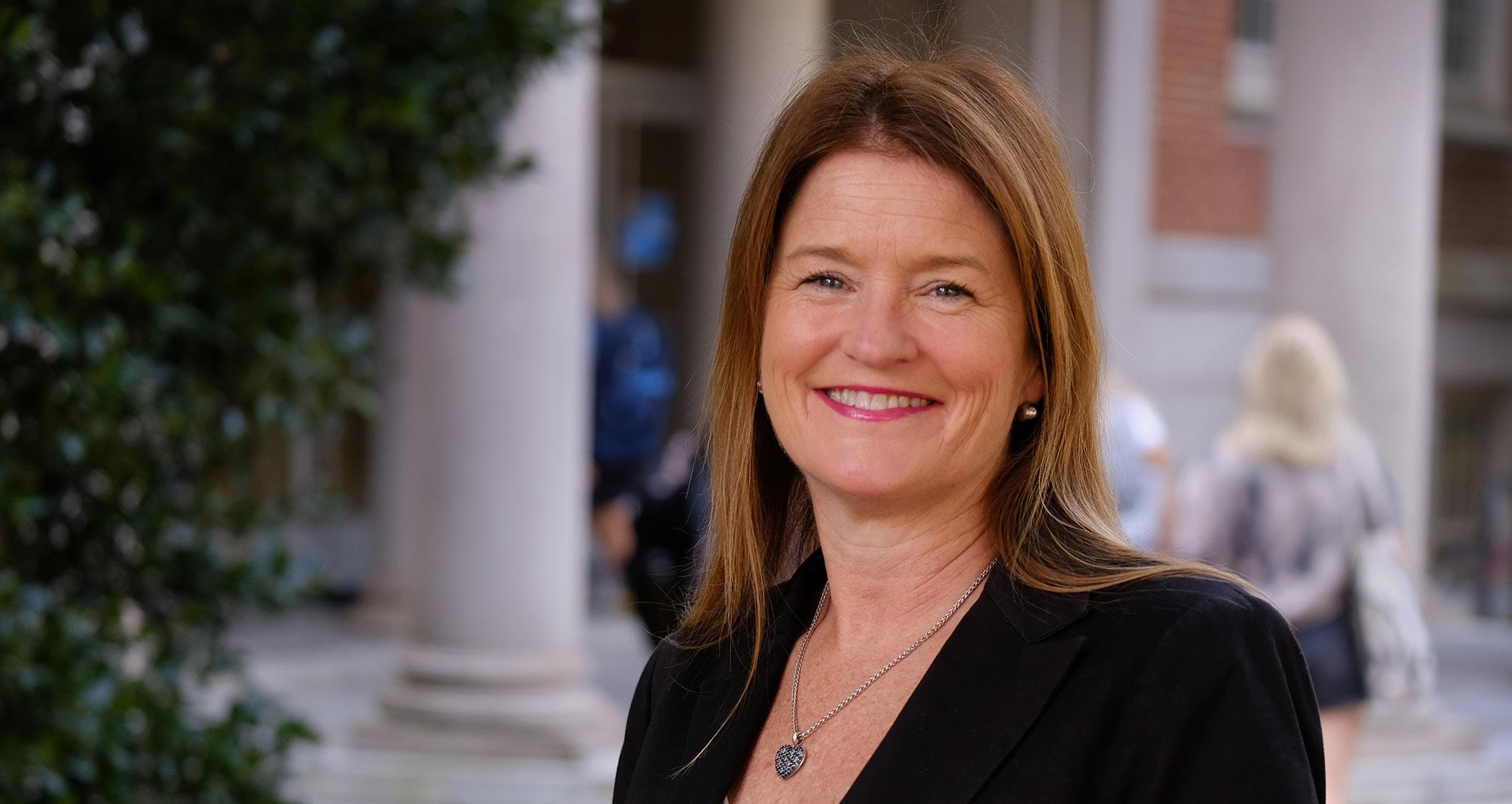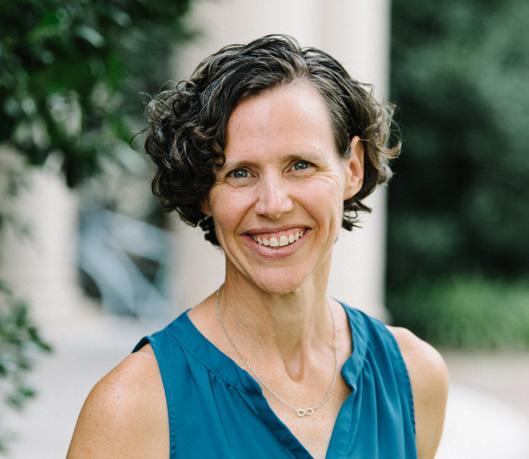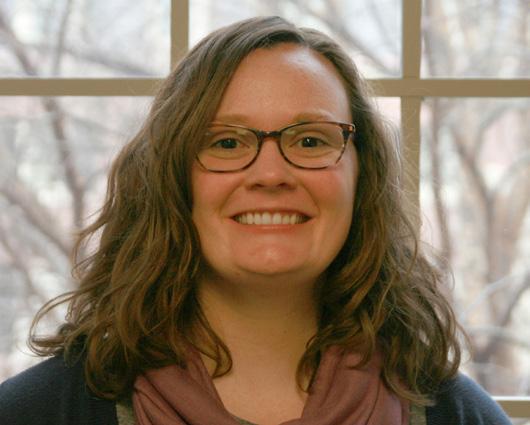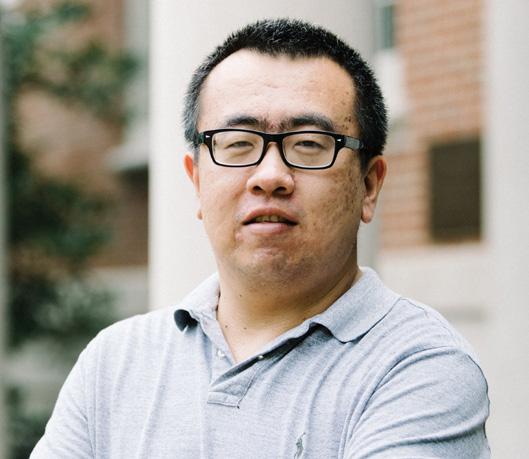
19 minute read
RESEARCH
Advancing Knowledge, Driving Innovation
Faculty members at the UNC School of Education and their collaborators at the University of North Carolina at Chapel Hill and beyond pursue innovative educational research and projects. They explore the nature of learning that contributes to effective teaching, data-driven classroom interventions and curricular improvements, insightful analysis leading to informed policies, and evidence-based advancements in educator preparation.
Advertisement
$80.13m
2021-22 TOTAL RESEARCH PORTFOLIO
32
NSF-FUNDED PROJECTS
9
NIH-FUNDED PROJECTS
23
U.S. DEPARTMENT OF EDUCATION-FUNDED PROJECTS
Total Research Expenditures
$18m
$16m
$14m
$12m
$10m
$8m
$6m
$4m
$2m
0 $7.48m $7.55m $17.05m
$13.83m $14.60m
$11.64m
$6.97m
$4.75m $5.73m $6.20m $7.51m
2011 2012 2013 2014 2015 2016 2017 2018 2019 2020 2021
New Faculty
Dorothy Espelage

New supports needed to make schools safer learning environments
Educators, families, and students need to be actively involved in implementing new programs aimed at making schools safer places, according to a report from a task force of the American Psychological Association.
The APA conducted a survey of nearly 15,000 educators, school practitioners, administrators, and other school employees across all 50 U.S. states and Puerto Rico, finding that many teachers reported experiencing verbal harassment or threatening behavior from a student or parent of a student.
Dorothy Espelage, William C. Friday Distinguished Professor of Education, is a member of the APA Task Force on Violence Against Educators and School Personnel, which conducted the survey.
Espelage, who has studied school-based violence and bullying for more than 25 years and has developed comprehensive programs to reduce violence in schools, said schools and school districts need to make sustained efforts to involve teachers, students, and families in implementing violence prevention programs.
The task force is calling for more resources and programs, including a call for more support from Congress, that can help improve school climates.
But, too often, Espelage said, new programs are seen by teachers as “add-ons” that take them away from their other responsibilities and are not given enough time and effort to be successful.
“That’s my biggest fear,” Espelage said. “We can ask for all these resources, but if we are not prepared to do this deep integration and have the teachers’ voice and the parents’ voice and make sure that we really, really do have an eye toward all school members contributing to these resources, we’re going to fall short.
“Too many times school-based programs fail because of that lack of really thinking through ‘How can we make this really stay and stick?”’ Survey Results
The survey asked educators about their experiences with threats of violence — including verbal harassment, threats, or cyberbullying — from students, parents/guardians, colleagues, and administrators, as well as physical violence from students. Data were collected from July 2020 to June 2021, while many schools were operating in online or hybrid modes due to the pandemic.
One out of every three teachers reported at least one incident of verbal harassment or threatening behavior from a student, and 29% reported at least one incident from a parent of a student. The numbers were even higher for school administrators: Approximately 37% reported at least one incident of harassment or threat of violence from a student and 42% reported the same from a parent.
In response to the survey findings, the task force offered recommendations to address violence against school personnel, including:
• Supporting the mental health of school personnel as well as students and promoting trauma-informed practices.
• Enhancing school organizational functioning by including educators’ voices in decision-making.
• Providing research-based systemic training to prevent school violence.
• Improving preparation programs for educators to better understand and address the social-emotional needs of students and other educators.
Members of the task force participated in a congressional briefing to present the findings and requests that included a list of actions that could be taken by Congress, including enacting bills being considered and funding priorities that could help address the issues identified by the survey.
Constance Lindsay

Improving racial equity in schools
Helping educators be more responsive to the needs of racially diverse students is the objective of two Institute of Education Science-funded projects in which School of Education faculty member Constance Lindsay is serving as a co-principal investigator.
The projects offer two approaches to addressing inequities pervasive in U.S. schools that result in Black and other underrepresented students having lower rates of academic achievement, greater rates of suspension and expulsion, and lower likelihood of graduating from high school and college.
“Persistently stubborn racial inequities run deep in schools across America, with harms that can inhibit life goals of so many people,” Lindsay said. “We need to identify methods through which education leaders and educators can reduce these inequities and expand educational opportunity to all students. These studies will help us do that.”
The larger of the projects, supported with $3 million in funding from IES, will create and test a set of measures that schools and school districts can use to identify and address systemic inequities.
While ideas about inclusion and equity have been integrated into school leadership standards, the researchers say, education leaders continue to struggle with how to identify and promote actual inschool practices that make all students feel welcome and support their academic growth.
As part of the project, a team of researchers led by Jonathan Supovitz, a professor at the University of Pennsylvania’s Graduate School of Education, will create a toolkit that seeks to encourage practices that expand educational equity through “culturally responsive” schooling. Lindsay, an assistant professor who conducts research on policies and practices that affect achievement gaps in education, is serving as the head of the project’s validation team, “We need to identify methods through which education leaders and educators can reduce [racial] inequities and expand educational opportunity to all students.”
ensuring that the project’s processes and products accurately measure what they are intended to. The team will work with The Leadership Academy, a national leadership development nonprofit that has worked with schools and school districts, to cultivate culturally responsive leadership and schools.
The second project, with $530,000 in funding from IES, seeks to examine how teachers can improve their racial competency — specifically how White teachers can increase their racial competency to become more effective teachers to students of color.
The project will examine whether the racial makeup of teachers’ colleagues affect their teaching effectiveness or persistence in the classroom. It will also seek to measure the impact of the racial demographics of the students in teachers’ classrooms on the effectiveness of those teachers.
The project will use data from third-through-fifth grade classrooms throughout North Carolina, seeking to determine White teachers’ effects on Black and Latino students’ achievement, attendance, and suspensions. It will also examine the overall effectiveness of Black and Latino teachers, and test for differences in effects considering teachers’ length of classroom experience and their exposure to co-workers of different races within schools.
UNC School of Education, N.C. School of Science and Mathematics form research partnership

Troy Sadler The UNC School of Education and the N.C. School of Science and Mathematics (NCSSM) have formed a partnership in which researchers will study the effectiveness of the STEM-focused high school’s programs. The effort, funded with a grant from the N.C. Policy Collaboratory, is intended to become a long-term collaboration between the School of Education and NCSSM that works to promote equitable and effective STEM education.
The collaboration comes in the form of a “research-practice partnership” in which researchers will study initiatives at NCSSM and use those findings to improve the school’s educational practices and outcomes.
The project is supported by a $150,000 grant from the N.C. Policy Collaboratory, a UNC System center that works to employ policy and research expertise at UNC System universities for practical use by state and local governments.
Troy Sadler, Ph.D., the Thomas James Distinguished Professor of Experiential Learning at the UNC School of Education, is the principal investigator on the project, with Daniel Klasik, Ph.D., an assistant professor, serving as a co-principal investigator. Krissi Hewitt, executive director of institutional effectiveness and chief research officer at NCSSM, is also a co-principal investigator and will co-chair, along with Sadler, the leadership team managing the project. A steering committee made up of leaders at the two schools will provide overall guidance.
NCSSM, which is administered as part of the UNC System, is a residential high school located in Durham for academically talented students from across North Carolina in their junior and senior years. NCSSM will open a new campus in Morganton, N.C., this year.
NCSSM recently was ranked as the second-best public high school in the country by Niche, a leading firm that advises families in their high school and college searches.
The partnership’s first studies will examine NCSSM’s Summer Ventures program, a four-week program for North Carolina students in their third or fourth year of high school. Another focus of examination by the partnership will be NCSSM’s various course delivery models, including residential, online, and remote enrollment.

Daniel Klasik
Doctoral student-faculty research collaborations showcased at AERA
The annual meeting of the American Educational Research Association (AERA) took place April 21-26, 2022, in San Diego, drawing more than 11,000 educational researchers from around the world to present the latest in educational research. From the UNC School of Education, 23 faculty members and 27 students contributed to the conference in 60 different events. Almost half of those 60 events had doctoral student involvement, highlighting the strength of the School’s doctoral student preparation efforts.
“Our doctoral students are deeply involved in our research efforts,” said Jeff Greene, Ph.D., the McMichael Family Professor. “Their contributions are readily apparent by their active participation at AERA, both in presenting their own research and as collaborators.”
Doctoral students were lead or solo authors on 17 papers presented at the conference. Their participation included presentations in symposia, roundtable discussions, and paper presentations.
The AERA’s annual meeting is the largest gathering of scholars in the field of education research. The theme of the conference this year was “Cultivating Equitable Education Systems for the 21st Century.”
Katherine Ingram, a doctoral student in the School of Education’s School Psychology program, was one of the doctoral students presenting her own research. Her dissertation research — centered on understanding the motivations that prompt adolescent “sexting” — has won a $100,000 dissertation award from the National Institute of Justice.
Dorothy Espelage, Ph.D., William C. Friday Distinguished Professor of Education who works with school psychology doctoral students, has worked with Ingram on her research and was a co-presenter with Ingram at AERA.
“Katie’s research is critical for understanding who, why, and how adolescents participate in sexting behavior so that we can build programs to prevent the harms that can come from them,” Espelage said. “Presenting this research in a forum such as AERA gives students experience presenting their work in a professional setting and also helps spread findings that can contribute to others’ research efforts.”
Reforms of teacher evaluation systems across the country during the last dozen years have largely failed their primary goal: To raise student academic performance.
That’s one of the findings of a study co-authored by Matthew Springer, Ph.D., published as a working paper by the Annenberg Institute at Brown University.
Incentivized by the federal government’s Race to the Top grant competitions between 2009 and 2017, 44 states and the District of Columbia implemented reforms aimed at linking the evaluations of teachers to the academic performance of their students.
The bottom line: The reforms had no discernible effect on student achievement in mathematics or English language arts and little effect on educational attainment.
The study, which its authors say provides the broadest and most generalizable evidence of the efficacy of teacher evaluation reforms in the U.S., concludes that despite billions of dollars spent reforming teacher evaluation systems, the reforms have had almost zero positive effect on student outcomes.
“These data show that on average across the country, teacher evaluation reforms haven’t had their intended effect,” said Springer, the Robena and Walter E. Hussman Jr. Distinguished Professor of Education Reform. “We found that while linking teacher evaluations to student performance has worked in a few places, it has proved to be very difficult for most school districts to establish these systems in ways that contribute to better academic outcomes for students.”
Before the reforms, teacher evaluations relied primarily on observations, had little direct connection to teacher compensation or employment, and saw nearly all teachers receiving satisfactory ratings, leaving no way to differentiate among the teachers’ performances.
Reform proponents advocated teacher evaluation systems that consider student performance would make it possible for districts to reward effective teachers, while also identifying lower-performing teachers in need of professional development or to be removed from their jobs.
The reform efforts also may have had unintended consequences of driving down job satisfaction among educators and imposing burdensome demands on administrators’ time, perhaps displacing other more productive activities, the team said.

Program shown to be effective helping autistic high school students
In a first-of-its-kind study, researchers led by Kara Hume, Ph.D., found that a new comprehensive intervention for high school students with autism was more successful in helping them reach educational goals than services typically provided for autistic students.
Results of the three-year efficacy study of the Center on Secondary Education for Students with Autism (CSESA) model — the largest study ever conducted of a comprehensive intervention for high school students with autism — were published in the journal Exceptional Children.
“We’re excited to share these findings, as they come from the first large-scale randomized control trial of an intervention aimed at improving services for high school students with autism,” Hume said. “The CSESA model has been getting some attention from researchers and practitioners in the field of autism, and now this is the first study that demonstrates that the model can help schools provide better supports for these students.”
The CSESA model was developed by a team of researchers at seven universities, and was led by Hume and Sam Odom, former director and now a senior research scientist at UNC-Chapel Hill’s Frank Porter Graham Child Development Institute. Supported by a grant from the Institute of Education Sciences, the team previously spent two years developing the model and training teams of high school educators how to use it.
The study involved 60 high schools in North Carolina, Wisconsin, and California, examining the outcomes of the 547 students with autism initially enrolled in the study and their families. Researchers compared the outcomes of two sets of students with autism: Those at 30 high schools using the CSESA model and those at 30 high schools using services typically provided for autistic students.
Among its results, the study found that schools using the CSESA model saw significant positive changes in the quality of programming offered to students, as well as significantly more attainment of the students’ learning goals.
Hume and fellow researchers reported that although implementation of the CSESA model is labor-intensive and requires a multiyear commitment, the program was well received by the school autism teams that used it.

Alumna Nikki G. Lobczowski wins outstanding dissertation award
Nikki G. Lobczowski (’19 Ph.D.), who works as a postdoctoral associate at the University of Pittsburgh’s Learning, Research, and Development Center, won the 2021 Paul R. Pintrich Outstanding Dissertation Award from Division 15 (Educational Psychology) of the American Psychological Association.
Lobczowski, who earned her doctorate in the Learning Sciences and Psychological Studies concentration of the Ph.D. program, conducted research for her dissertation examining group dynamics and the regulation of emotions among college students working in a collaborative setting.
Her dissertation, entitled “Building from the Inside Out: The Formation and Regulation of Emotions in Collaborative Learning,” provides suggestions for how researchers and teachers can promote socioemotional regulation among students working together in academic settings. The dissertation includes three articles, including a literature review, empirical paper on the socioemotional formation and regulation with graduate pharmacy students, and a theoretical paper that introduces a new model for the formation and regulation of emotions in collaborative learning (FRECL), which was published in Educational Psychologist. Jeffrey Greene, the McMichael Family Professor at the School of Education, was Lobczowski’s advisor.
Lobczowski, who earned both an M.Ed. in curriculum and instruction and a B.S. in mathematics from Virginia Tech, served as a postdoctoral fellow at the Human-Computer Interaction Institute at Carnegie Mellon University after earning her Ph.D. at Carolina. She is an author of 15 articles in refereed journals, including as lead author on four of them.

Li Ke, a postdoctoral research associate with the School of Education, won a 2021 Postdoctoral Award for Research Excellence.
The awards are given by the UNC Office of Postdoctoral Affairs in recognition of the research promise demonstrated by individual postdoctoral scholars. He was one of five postdocs at Carolina to win one of the awards.
Ke’s research centers around promoting meaningful science learning. In particular, he is interested in how teachers can support students in engaging in scientific practices such as scientific modeling in ways that are meaningful to the discipline of science, the classroom knowledge building community, and students’ everyday lives.
Ke conducts research with Troy Sadler, the School’s Thomas James Distinguished Professor of Experiential Learning. Their projects address promotion of students’ scientific literacy through modeling in the context of socio-scientific issues.
He has published eight journal articles, including three as lead author, and has written two book chapters. He’s a co-principal investigator on a $1.9 million National Science Foundationfunded project aimed at developing instructional materials using scientific modeling to teach about viral pandemics. Ke also serves as managing editor of the Journal of Research in Science Teaching. School of Education faculty win $3.5 million in NSF research funding

Researchers at the UNC School of Education won more than $3.5 million in National Science Foundation awards to pursue five projects — three focused on STEM learning and two regarding learning in the COVID-19 pandemic.
The awards will support investigations that promise to reveal new understandings that inform instructional practices and policies, including ones that can better extend educational opportunity to underserved students, said Fouad Abd-ElKhalick, dean of the UNC School of Education.
“We are appreciative of this support from the National Science Foundation,” Abd-El-Khalick said. “These awards are indicative of the strengths of our researchers, and the relevance of their research agendas during this time of challenge and change in education.”
The projects supported by the awards include one that is producing and evaluating middle and high school science instructional materials based on the COVID-19 pandemic, another that will explore what we can learn from families’ responses to the pandemic, and three projects investigating aspects of the STEM educational and career pipelines.
Jill Hamm, associate dean for research and faculty development, said it was notable that each of the five awards was from different NSF program competitions.
“We have innovative researchers who are diving into important questions across a range of fields within education,” Hamm said. “This round of NSF funding will help these researchers uncover new data, insights, and interventions that can fuel improvements in educational experiences and outcomes for learners at all levels.”
Our researchers are actively engaged at the forefront of their communities of scholarship. They serve as editor or associate editor for some of our fields’ leading academic journals, collaborating with editorial team members from institutions across the nation and globe to push their areas of scholarship. The rigorous and cutting-edge research featured in these publications expand and strengthen our understandings in educational fields and drive practice in P-20 educational institutions and communities.
Brian Boyd, Ph.D., William C. Friday Distinguished Professor in Education, serves as an associate editor of the American Journal on Intellectual and Developmental Disabilities (AJIDD). AJIDD is among the top journals in the special education and rehabilitation fields. It reports critical research in biological, behavioral, and educational sciences, and is a singular, multidisciplinary resource in the causes, treatment, and prevention of intellectual disabilities.
Educational Psychologist
Jeffrey A. Greene, Ph.D., McMichael Family Professor, is co-editor of Educational Psychologist, one of the top journals in educational research and the journal of Division 15 (Educational Psychology) of the American Psychological Association. He serves alongside co-editor Lisa Linnenbrink-Garcia, a professor at Michigan State University.
Educational Researcher
Thurston “Thad” Domina, Ph.D., Robert Wendell Eaves Sr. Professor in Educational Leadership, is one of five co-editors leading Educational Researcher, the premier academic journal of the American Educational Research Association. He shares co-editor responsibilities with June Ahn, an associate professor at the University of California, Irvine; Andrew McEachin, a policy researcher at the RAND Corporation and a core faculty member at the Pardee RAND Graduate School; Dana Thompson Dorsey, an associate professor and associate director of research and development for the Center for Urban Education at the University of Pittsburgh; and Sarah Woulfin, an associate professor at the University of Connecticut.
Journal of Research in Science Teaching
Troy D. Sadler, Ph.D., Thomas James Distinguished Professor of Experiential Learning, serves as co-editor — with Felicia Moore Mensah of Teachers College at Columbia University — of the Journal of Research in Science Teaching (JRST). JRST is the leading academic journal in the field of science education and is the official journal of NARST. The journal was previously co-edited, from 2014-2019, by UNC School of Education Dean Fouad Abd-El-Khalick, Ph.D., and Dana Zeidler from the University of South Florida. Donald & Justeen Tarbet Faculty Scholar Kihyun “Kelly” Ryoo, Ph.D., who previously was an editorial review board member for the journal, serves as an associate editor.
Professional School Counseling
Dana Griffin, Ph.D., associate professor of school counseling, serves as associate editor of Professional School Counseling — the flagship journal of the American School Counselor Association and of the school counseling profession. Professional School Counseling is a rigorous peer-reviewed journal that publishes high-quality manuscripts on theory, research, and best practices for the profession.
The Urban Review
Sherick A. Hughes, Ph.D., Samuel M. Holton Distinguished Professor, serves as editor of The Urban Review, a journal devoted to examining issues around improvement of urban schooling and education. The Urban Review was previously co-edited by retired professor George Noblit. Doctoral student Torrie Edwards serves as managing editor.
Educational Evaluation and Policy Analysis
Nianbo Dong, Ph.D., Kinnard White Faculty Scholar, serves as one of five associate editors of Educational Evaluation and Policy Analysis, a leading scholarly journal in the field of education research. He will help lead the journal from 2023-2025. Educational Evaluation and Policy Analysis is considered a premier journal for rigorous, policy-relevant research on issues central to education. It publishes articles intended to inform a wide range of readers — from scholars and policy analysts to journalists and education associations — working at local, state, and national levels.





